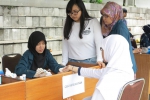O2Go: The Free Medical Oxygen Supply Technology in Indonesia

BANDUNG, itb.ac.id—Students and professors of ITB (Institut Teknologi Bandung) worked together in creating O2Go, the medical oxygen supply technology. The public health office of Bandung requested this product to face the pandemic. The invention was made by ITB students of FMAE (Faculty of Mechanical and Aerospace Engineering), FIT (Faculty of Industrial Technology), SEEI (School of Electrical Engineering and Informatics), and students from the Medical School of Unpad (Padjajaran University).
Fandika Ikhsan (MS’18), the project leader, reported that the plan has been set in motion since last June. It began with research and reverse engineering in various regions like Depok and Bandung. Then, the study progressed into the internet and journal-based research. It also included prototype trial-and-error and upscaling.
Currently, the O2Go team is occupied with both testing and tracing of zeolites for air filtration. This investigation also covers improvements in air quality and oxygen volume per minute. “Normally, there is only 20% of oxygen around us. The rest are other matters,” explained Fandika.
This technology is predicted to generate ten liters of oxygen per minute, with its quality reaching 80%. Such achievement can fulfill people's oxygen demand on a large scale. Meanwhile, O2Go is still in the process of adapting, producing one liter of oxygen per minute with its quality exceeding 50%. Even though the project still undergoes prototype experimentation, research and upscaling, Fandika is optimistic that its research documents can be distributed soon to other parties for further development and production.
“Here, we emphasized the spirit of open-source materials. When others are racing for the chance to commercialize their innovations, we are planning to make a shareable document to allow other campuses to manufacture this product by themselves and help one another,” he added.
Moreover, Muhammad Syaiful Hadi or Ipung (MS’18) shared the excitement of collaboration across different majors. As the head of the publication team, he noticed that students are not the only participants; professors from other faculties actively partake as well, whether it was directly or indirectly.
“In this joint effort, lecturers do not only act as our bosses but as fellow teammates in the field as well,” Ipung stated. He also mentioned that the entire experience is impressive because it is rare to witness professors from different faculties work together.
Several educators involved have various perspectives and expectations towards this technology. Vani Virdyawan, S.T., M.T., Ph.D., who had just finished her doctoral degree in England, viewed this project as a new learning ecosystem between students and teachers. She also hoped that the product can be beneficial for both student growth and societal welfare.
Another contributing professor, Dr. Grandprix Thomryes Marth Kadja, M.Si., supported the creation of the zeolite adsorbent that enhances air filtration. The youngest lecturer to hold the Doctorate title in Indonesia taught that adsorbents are usually imported and cost a large sum of money. “I hope that we can make our absorbent with high-quality materials from our country,” he wished.
Reporter: Daffa Raditya Farandi (Kewirausahaan 2023)
Translator: Ruth Nathania (Teknik Lingkungan, 2019)

scan for download






